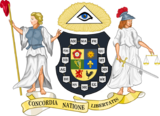Galicianna
Kingdom of Galicianna Raiñado de Galicianna | |
|---|---|
| Motto: Aquí está o misterio que firmemente profesamos ("Here is the mystery that we firmly profess") | |
| Anthem: Rumorosos, que dixeran | |
| Capital | Monteaño |
| Official languages |
|
| Ethnic groups |
|
| Religion |
|
| Demonym(s) | Galianan |
| Government | Unitary Parliamentary Monarchy |
• King | Xacobo II de Beariz |
• Prime Minister | Lois Mondariz |
• President of the Government | Xaquín Pau |
| Legislature | National Assembly of Parliamentary Representation |
| Senate | |
| Parliamentary Chamber of Representatives | |
| Unification of the Duchies | |
• Foundation of the Nation | 1065 |
• Creation of the Constitutional Monarchy | May 14th, 1876 |
| Population | |
• January 2020 estimate | 72,950,898 |
| GDP (PPP) | 2020 estimate |
• Total | $1,971,133,263,960 |
• Per capita | $27,020 |
| GDP (nominal) | 2020 estimate |
• Total | $1,236,517,721,100 |
• Per capita | $16,950 |
| Gini (2020) | medium |
| HDI (2020) | very high |
| Currency | Ameixas (AMX) |
| Driving side | right |
| Calling code | +341 |
| Internet TLD | .gal |
Galicianna, officially the Kingdom of Galicianna is a parliamentary monarchy, composed of 13 duchies, 1 maritime county, a suburban region and a capital district. Its capital city, Monteaño, is home to the country's key political, judicial, and financial institutions. The country is situated in two continents: the continental zone is located in Thrismari and the archipelagos in Thuadia . Galicianna is bordered by Vileria to the north, and Amilagro to the east.
Being a very ancient nation (having been founded at the beginning of the 11th century), it was a fairly isolated nation for many centuries, having a very homogeneous ethnic, cultural and religious composition. The country remained closed and isolated until the mid-20th century, when policies of opening and incorporation into the international market began to be promoted. These would begin to be applied more strongly in the 1970s, and the country would experience rapid industrialization, economic growth and urbanization.
Currently, Galicianna is considered a developing country. Despite having a human development index considered "very high" and having a relatively high GDP per capita, the country suffers from high inequality and a lack of a welfare state. However, inequality has been gradually falling over the last ten years and more public services have been created. Galicianna is expected to become a developed country in the next 10 years.
The country's economy is based mainly on the tertiary sector, with a large participation of the secondary sector. The industry represents 37% of the country's GDP, the main ones being electronics, agri-food and oil. The country also has a developed financial system, with important banking entities. Agriculture barely represents 3% of the nation's GDP, highlighting winegrowing and the cultivation of tropical fruits such as pineapple, mangoes and bananas.
Galicianna scores fairly well on measures of democracy and political freedom, being considered a "deficient democracy". However, it has poor scores in statistics such as press freedom, corruption index or respect for the environment.


